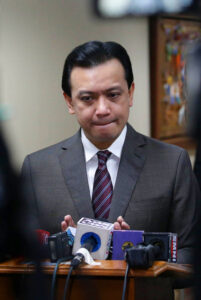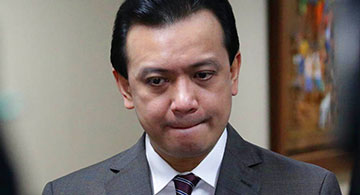
With an impressive –if not controversial – résumé, Senator Antonio “Sonny” Trillanes IV has ridden a high-speed “roller coaster” all his adult life. Several times he reached rock bottom and several times he reached the high point of his life: from a naval lieutenant to a mutineer and rebel to a prisoner and to a senator (elected while in jail). He was granted amnesty, two civil cases against him were dismissed, a court martial was dismissed, he was re-elected as senator, and he also ran for vice-president. And now, he’s faced with the most challenging threat that could end in a life in prison.
At the core of Trillanes’ recent problem is President Rodrigo Duterte’s Presidential Proclamation 572 – or PP 572 — on August 31, 2018 that voided his amnesty because he allegedly, “failed to apply and refused to admit guilt” for the amnesty.
PP 572 stated that the amnesty granted to Trillanes was “void ab initio” or “invalid from the beginning” as Trillanes supposedly failed to comply with two requirements for amnesty: (1) application for amnesty and (2) admission of guilt. It directed the Department of Justice (DOJ) and the court martial to pursue criminal and administrative charges, and both the army and the police to “apprehend” him and bring him to jail.
But Trillanes, in a press briefing, debunked the validity of Duterte’s PP 572. He produced signed documents showing that he had filed an application for amnesty and that he had admitted guilt. But that didn’t deter the government.
On September 4, 2018, Justice Secretary Menardo Guevarra announced that the DOJ would seek an arrest warrant from civilian courts. The first is the Makati Regional Trial Court (RTC) Branch 148, which handled the coup d’état charges against Trillanes in relation to the Oakwood Mutiny in 2003. But the Trillanes camp published a copy of the decision they obtained from Branch 148, which indicated that the charges were not “merely suspended,” as the DOJ had claimed, but were dismissed on September 21, 2011.
Then, on September 7, 2018, the DOJ filed a motion for an arrest warrant at the Makati RTC Branch 150, which handled the rebellion charges against Trillanes in relation to the Manila Peninsula Hotel incident in 2007. But again, the Trillanes camp produced a copy of a decision, which showed that Branch 150 dismissed the charges on September 7, 2011.
With Trillanes’ revelation of the dismissal of the two cases before the civilian courts in 2011, the DOJ changed its strategy. DOJ insisted that despite the dismissal of the charges, the case against Trillanes before a court martial could be reopened.
In response to the DOJ’s pleadings for an arrest warrant, the RTC Branch 150 ordered the DOJ to submit within five days, a reply to Trillanes’ opposition to their pleading. The court also ordered Trillanes to file within five days a rejoinder to DOJ’s reply. The RTC Branch 148 also ordered Trillanes to file within ten days his rejoinder to DOJ’s pleading. It is expected that the two cases before the civilian courts, whichever way they go, would eventually reach the SC.
Moro-moro
It’s interesting to note that the AFP had recognized Trillanes’ “ipso facto resignation” in May 2007, four years before he was granted amnesty. If the amnesty is valid, how could the government reopen the court martial? Isn’t it that once amnesty is granted, it cannot be rescinded?
Trillanes laughed off the “absurdity” of bringing him before a court martial. He was jailed for seven and a half years until he was granted amnesty in 2011. He claimed that the military could no longer regain jurisdiction over him since he had gained amnesty, which he claimed isn’t revocable. Besides, PP 572 also violates his protection against double jeopardy.
But the Department of Defense (DOD) insisted that the court martial has jurisdiction over Trillanes because he is reverted back to military service due to the voiding of his amnesty; thus, Trillanes can be arrested without a warrant. But how can they revert him back to military service when the Armed Forces of the Philippines (AFP) had honorably discharged him with full benefits? Besides, isn’t there a 15-day window for contesting the amnesty, which had long since lapsed?
Okay, so the amnesty case is being revived, huh? Now, it’s beginning to look like a moro-moro, which is more entertaining than anything else. Indeed, a Manila columnist dismissed PP 572 as a “bad joke.” But to Trillanes, it’s not a joke; he’s fighting for his life.
How it all started
It was revealed that Solicitor General Calida was the one who looked into Trillanes’ amnesty records at the prodding of Chief Presidential Legal Counsel Salvador Panelo. Trillanes knew it. He tagged Calida as the “mastermind” behind PP 572, which raises the question: Why did Calida do it? Many believed that it could be because Trillanes questioned Calida’s “conflict of interest” in government contracts.
On September 4, 2018, the same day that DOJ announced that it was seeking an arrest warrant from civilian courts, Trillanes, who is the chairman of the Senate Civil Service and Government Reorganization committee, held a hearing on the contracts between government agencies and Vigilant Investigative and Security Agency (VISA) Inc., which is owned by Calida’s family. Trillanes showed that Calida remained the majority shareholder and president of VISA after Duterte appointed him Solicitor General in 2016. However, Calida stated that he resigned as president of VISA and as such was no longer required to divest his shares in the company. But shouldn’t he have established a “blind trust” in which he would have transferred control of his stocks to a trustee, which begs the question: Could it be Trillanes’ delving into Calida’s business the reason why Calida investigated Trillanes’ amnesty? Or could there be a higher authority that ordered Calida to look into the matter?
Legality of PP 572
But it is not over yet. On September 10, 2018, Trillanes filed a petition before the Supreme Court (SC) for a Writ of Preliminary Injunction (WPI) and Temporary Restraining Order (TRO), and also challenged the constitutionality of PP 572. The following day, the Supreme Court en banc denied Trillanes’ petition. However, the en banc gave the Office of the Solicitor General (OSG) ten days to prove the constitutionality of PP 572.
The SC’s denial of Trillanes’ petition for WPI and TRO was primarily based on Duterte’s acknowledgment that Trillanes “will not be apprehended, detained or taken into custody” without the warrants from the Makati RTC’s. While this seems like a victory for Trillanes, it’s just a battle won but the war still goes on.
With the SC’s denial, the ball now goes back to the two RTCs to hear the DOJ’s pleadings for a warrant of arrest against Trillanes. This would give Trillanes the opportunity to present evidence of the dismissal of the original charges before the two RTC’s in 2011.
While that might allay the public’s concerns – and fears — that Trillanes is being persecuted, there is a glimmer of hope that the RTCs would reject the government’s position that the amnesty is null and void. But, would that be the end of the controversy surrounding Trillanes’ amnesty? Or would it be the beginning of a process leading to the Supreme Court who would be the final arbiter on the constitutionality of PP 572?
Last September 11, Duterte and Panelo held a televised tête-à-tête, where Panelo asked Duterte questions given by the press. They discussed many topics including Trillanes’ amnesty. “If the Supreme Court would say that my proclamation is null and void, then let it fall. If affirmed or sustained, it’s the military now,” Duterte noted, acknowledging the jurisdiction of the military over Trillanes if the Supreme Court rules in favor of the government, which makes one wonder: Would Duterte accept a Supreme Court ruling that PP 572 is unconstitutional? If not, what would be his game plan? Would he just let Trillanes walk away? Or, could it be that this will be the start of Trillanes’ real problems?
At the end of the day, people wouldn’t fail to ask: Is Trillanes being prosecuted or persecuted?


